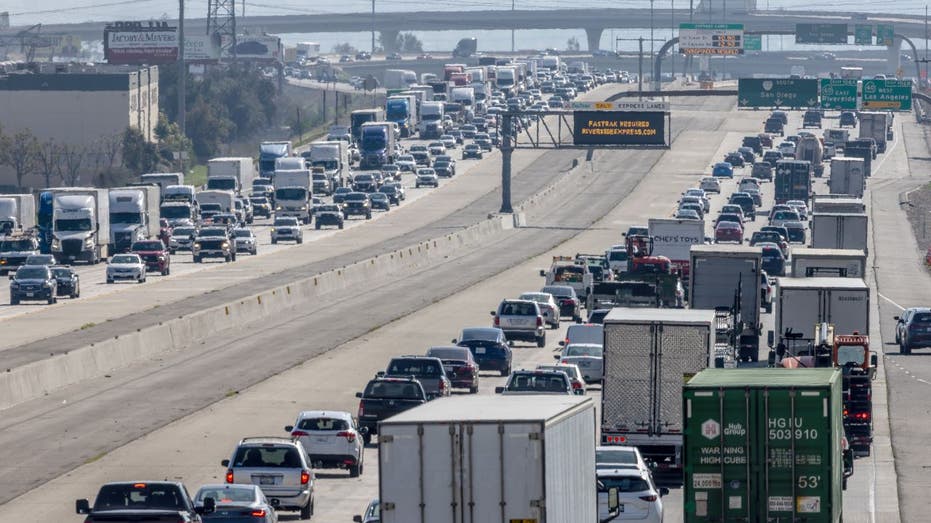EVs may make air dirtier than gas-powered cars as California pushes new mandates: study
California is looking for the EPA to approve a regulation that would ban new sales of gas-powered cars in 2035
EV mandates are arbitrary and capricious regulatory action: Michael Buschbacher
Boyden Gray PLLC law firm partner Michael Buschbacher details evidence proving electric vehicles may not be as green as the public thinks.
Regulatory mandates to compel the adoption of electric vehicles (EVs) may create new emissions problems that undercut some of the green goals they seek to achieve, according to an environmental lawyer.
Boyden Gray PLLC law firm partner Michael Buschbacher, who worked in the Justice Department's Environment Division in 2020-21 and specializes in environmental law at his current firm, said in an appearance on FOX Business Network's "The Big Money Show" that California's effort to ban the sale of new gas-powered vehicles by 2035 could result in dirtier air than intended. The California proposal is under review by the federal Environmental Protection Agency (EPA).
California's regulatory plan to ban new gas-powered vehicles more than a decade from now is aimed at protecting public health by reducing the amount of particulate matter — like dust, dirt and soot — that's in the air. Although gas-powered vehicles in the past have emitted more particulate matter, technological updates to engines have made it so there is little particulate matter produced from gas cars, Buschbacher said.
"What they've done with particulate emissions… is they've assumed that a comparable EV and a comparable internal combustion engine vehicle are going to have the same amount of particulate matter emissions, and that's just not true," he explained. "Today's cars are so clean that almost all of the particulate matter comes from tire wear."
MUSK RIPS PURPORTED ECO-TERRORISTS FOR SUSPECTED ARSON AT TESLA GIGAFACTORY: 'EXTREMELY DUMB'

California is looking for the EPA to approve a regulation that would ban new sales of gas-powered cars in 2035. (Irfan Khan / Los Angeles Times via Getty Images / Getty Images)
"Electric vehicles are about 15% to 30% heavier than a comparable conventional vehicle. And so studies have shown that the particulate matter from that tire wear and net particulate matter, in general, is significantly higher for EVs. But when California and EPA look at it, they treat them the same," Buschbacher said.
He and Boyden Gray, research fellow Taylor Myers, outlined their opposition to the regulatory approach taken by California and the EPA in a Wall Street Journal op-ed. Buschbacher added that considering particulate matter emissions from EVs and gas cars as equal is flawed, saying that, "As we explained, that's just wrong and it's… just one of many ways in which the thumb gets put on the scale to force electrification."
BIDEN ADMINISTRATION CONSIDERING EV SWITCH DELAY DUE TO WEAK DEMAND

Traffic in San Francisco, California, on Tues., Dec. 5, 2023. (David Paul Morris/Bloomberg via Getty Images / Getty Images)
He went on to tell FOX Business Network's Jackie DeAngelis that the data California included in the regulatory proposal sent to the EPA review included an assumption that EVs will eventually be as light — and thus produce comparable particulate matter from tire wear — as gas-powered vehicles without substantiating how automakers will make that a reality.
"What's amazing about this is that they don't even have any junk science. When you actually read, you have to go to page 116 of Appendix A of the regulatory filings that EPA has gotten from California to find where California actually talks about this. And they say that it would be speculative to assume that carmakers won't equalize the weight by doing something — they don't say what — in the future," Buschbacher said.
GET FOX BUSINESS ON THE GO BY CLICKING HERE
"So they don't even have anything. They're just saying, 'Well, we think in the future because of magic reasons nobody knows why that things are going to change.' And that's just irresponsible, I mean I think that's the very definition of arbitrary and capricious regulatory action by California," Buschbacher added.
